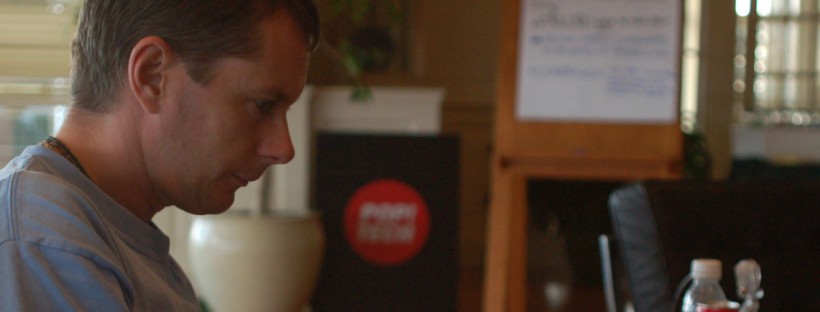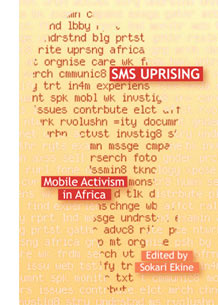January 2010 is National Slavery & Human Trafficking Prevention Month. In this, the nineteenth in our series of FrontlineSMS guest posts, Aashika Damodar – Founder of Survivors Connect – gives some background and context on the challenges of fighting human trafficking, and talks about the impact FrontlineSMS has had on their anti-trafficking efforts
“The telephone is used to connect between the commune, district, or the province and throughout the country. When we didn’t have the telephone, it was very difficult to communicate. I had to send men by boats or bicycles. It would take at least one to five days”
Mr. Khao Phorn, 62, Commune Chief
“There is no electricity in this commune. People use oil lamps, batteries, and dynamos. I recharge my telephone at my mother’s house with a fueled dynamo. Using the telephone is very important to communicate with family or relatives, and is quite cheap. Without the telephone, if we want to visit them, we would spend 40,000-50,000 for transportation each time”
Mrs. Phally, 30
“The Telephone is very important for our society. If there was no telephone, everything would be slow”
Mr. Seng Sareth, 53
“These are just some of the thoughts of people throughout SE Asia on the introduction of mobile phones in their daily life. With mobile phone usage on the rise, our team at Survivors Connect has been brainstorming: “How can such a small but powerful globalized tool of communication be used to address human rights concerns?”. We found it thanks to FrontlineSMS.
RaFH was established in 1993 as a non-profit organization, focusing on the fields of social health science, gender equality, women’s and child rights, reproductive health and family planning and the Northern and Southern most provinces of Vietnam, especially in rural, mountainous and remote areas where ethnic minorities and disadvantaged groups reside. Their mission is to contribute to national poverty reduction programs, deliver primary healthcare in target areas and improve human rights conditions.

Most recently RaFH, along with many non-profits in the region, have seen an increase in the trafficking of young women and children up to China for the purpose of domestic servitude, forced marriage and often times commercial sex and other forms of labor. This has been particularly problematic in the North where the Vietnamese-Chinese border is porous for locals, resulting in regular migration upward.
When the international community on anti-trafficking, as well as several NGOs like RaFH first took notice of this phenomenon, groups flooded into the region to start raising awareness in “vulnerable communities” along the border. Often this entailed skits, presentations, and material handouts that discuss what human trafficking looks like, who is a trafficker, what are popular job scams a trafficker may tell you and how to stop it. Many NGOs were satisfied with this work and were able to tabulate that they reached several hundreds of villagers.
However, this did not reduce incidents of people going missing, or trafficking. What we learned over time was that many of the activities of these NGOs were anti-migratory in nature and in their messaging. Without working with communities and building better education infrastructure, access to proper health care, and skills training, rarely would we be able to stop an individual from leaving their community or village for another job opportunity. Our question then became, how could we make migration safer and stop human trafficking from happening to others? This involves understanding the broader system of human trafficking, and an understanding of everything that happens between points of origin to points of destination.

This brought us to Lao Cai, a border province with Guangxi, China, with two international border gates and several paths by which local people travel regularly, and even daily for work. It is a busy commercial center, also popular for tourism. Lao Cai has 25 ethnic minorities such as the Hmong, Thai, Dao, Tai, Muong to name a few, accounting for 75% of the whole population there. These ethnic minorities have little access to education and major resources. With its geographical features, such as high mountains and remote and widely spaced communities, trafficking in women and children has been increasing. Lao Cai also borders with Ha Khau district in China where there are several brothels receiving victims of trafficking from Vietnam. Up to 2008, it is estimated that 341 women were trafficked up to China for commercial sex, and many more for marriage.
Earlier last year, RaFH held several training courses for 136 representatives of local authorities in the region such as police, health workers, women’s unions, from provincial and grassroots level, owners of hotels, restaurants and more. They were brought together to create what is popularly called (in anti-trafficking circles) “community intervention teams” (CITs), equivalent to US-based human trafficking task forces. They were taught all about human trafficking, major issues unique to Lao Cai and how each of them could respond from their vantage point if a case were to arise. From there, 8 CITs formed, each including about 7 members from the police, justice, health centers, women’s unions and others. Their main tasks are to identify trafficking cases and intervene, rescue and support victims. They also disseminate information in the community to raise awareness about the issue and teach others how to protect themselves from trafficking.
RaFH has created a formal center at the Provincial Lao Cai Womens Union, equipped with computers, books, as well as trained staff to counsel and support victims of trafficking. These types of centers can be found all around the world and prove to be most effective when they use the energy, talent and skills of all types of members in the community, from teachers to social service workers. It is in this space that Survivors Connect found an opportunity to support their CIT through the use of FrontlineSMS.

Why are we calling it Helpline SMS Networks? We’re using FrontlineSMS to coordinate CITs better and equip them with an easy and cost effective tool to respond to the needs of victims and survivors faster than they currently do. Their primary goal is to help victims, survivors and support the healthy functioning of a referral system/alert-response network. To have a well-concerted and coherent strategy to deal with human trafficking, which is mired in complexity, it is essential that all relevant agencies (both state and non-state) act as partners in effort, and are able to use their capacity to respond appropriately to all situations, like gears in proper alignment.
The referral system we’re building (with FrontlineSMS as the core platform) is essentially a network of agencies and individuals that provide support and services for a victim or survivor in a trafficking or unsafe migration situation. By using FrontlineSMS, they go beyond being a normal network – they are becoming a fast and efficient system for communication and information sharing.
So, how does the Helpline SMS Network work?
RaFH Counseling centers operate FrontlineSMS from their in-office laptop. All CIT members are equipped with a mobile phone that is strictly used for the Helpline SMS Network. From their computer, they have contacts organized based on location in Lao Cai, whether they are members of the CIT, or constituents/villages they have done awareness presentations to, health care workers, police, border patrol etc. They regularly send messages to their constituents about human trafficking, alerts on latest activity and cases. Villagers can text back, ask questions, be a part of the dialogue, and report to the CIT if there is an incident of violence, a sudden disappearance of a child, arrival of outsiders into a village, or simply if someone is planning to leave Vietnam.

This information is kept on the CIT’s radar and regular checks are made to see if he/she has made to their destination, or if there may be trafficking involved. If any of the members of the CIT find something in the field, they report their findings back to RaFH. They also use FrontlineSMS to stay in touch with their clients receiving services at the Counseling Center, in order to monitor the progress of every survivor and to ensure their safety in the rehabilitation process. It is these very survivors that also inform the messages, tactics and strategies used by the CITs because they know first hand what trafficking is and what the experience is like.
Below is a summary of the networks core functions:
Helpline SMS: “Ending Slavery one SMS at a Time”
Victim Identification: This aspect of RaFH’s work focuses on victim identification through a combination of community education and awareness-raising activities as well as implementing direct outreach strategies. RaFH collects the mobile numbers of people in their target areas so that they are first point of contact for a potential victim or for an individual wanting to migrate.
Distribute Information: The Helpline SMS network regularly sends mass texts to their target communities about latest trafficking cases, popular scams, offers a trafficker may make, and information about events and resources in their area.
Victim Services & Protection: Once victims are identified and out of his/her situation, they immediately present a wide variety of service needs. An adequate response to these needs requires a comprehensive service program including the power and skills of law enforcement, social service providers, health care workers and human rights advocates. These very people make up the CIT/SMS Network. When an individual or client is in some emergency situation or needs assistance either going to the hospital, police, or even a courtroom, he/she can contact the SMS Network or CIT to get that support.
Referrals: Lets the CIT/network know that a client is on his/her way for help and communicates the nature of the problem. Referrals can be for medical care, a legal advocate, police or anyone with the relevant skill set in the network.
Status Update: Allows CITs to stay in touch with individual clients/survivors and support them through the rehabilitation process.
Support Groups: The network connects survivors and clients receiving care at the counseling center with others and provides information on location for meetings and resources.
Campaigns: RaFH soon plans to use FrontlineSMS to run formal campaigns and surveys to determine how effective their services/quality of care is.
We have learned a lot about both human trafficking and the power of community-based approaches in combating modern-day slavery. By establishing a set of links between existing available resources and services, the system is regularly highlighting new gaps in services and allowing the network to improve. Overtime, its built-in “self improvement” character will help us understand why unsafe migration and trafficking occurs.
Thanks to the power of FrontlineSMS, we can build more effective human rights networks that cost little, deliver results, and combat trafficking better than we have ever seen. This software provides timely access to services, channels of information to those that need it, migrants, potential victims as well as agencies trying to serve them. We hope to replicate this model in other countries where rural trafficking is a great problem and hopefully make a serious stab at slavery in our lifetime“.
Aashika Damodar
Founder
Survivors Connect
www.survivorsconnect.org
Follow us on Twitter: @sconnect


 Turning to more traditional media, Fahamu/Pambazuka have published a new book –
Turning to more traditional media, Fahamu/Pambazuka have published a new book – 
